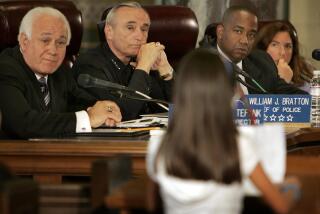ElBaradei Wins Third Term at Nuclear Agency
VIENNA — The board of the United Nations nuclear watchdog agency reappointed Mohamed ElBaradei to a third term as director general Monday in a move that was widely anticipated after the United States dropped its opposition to him last week.
ElBaradei, 62, was chosen by acclamation to continue his leadership of the International Atomic Energy Agency, or IAEA, by the agency’s 35-member Board of Governors, a spokeswoman said.
In comments to reporters after his reappointment, the onetime Egyptian diplomat underscored that he was not ready to end the agency’s two-year probe of Iran’s atomic energy program, which U.S. officials insist is a cover for nuclear weapons development.
“The Iran file will be closed when we close all the issues that are still open,” ElBaradei said. “We are inching forward, but I’d like to have more speedy cooperation on the part of Iran.”
Tehran maintains that its program is for only peaceful purposes including energy production and has denied U.S. allegations that its ultimate goal is to manufacture nuclear weapons.
ElBaradei praised Iran for granting inspectors access to nuclear materials held inside the country and for suspending its uranium enrichment program under a deal with three European Union countries. However, he said the U.N. nuclear agency, which is headquartered here in Vienna, needed to know more about Iran’s development of centrifuges, which are used to enrich uranium.
Recent intelligence from Western countries suggests that Iran has plans for an extensive enrichment program using thousands of centrifuges. The more concentrated form of uranium produced by the equipment can be used in weapons.
The U.S. had framed its objection to ElBaradei by saying that no one should serve more than two terms as director general. But it was widely known that American officials were frustrated with ElBaradei’s reluctance -- in the run-up to the American-led invasion of Iraq in 2003 -- to conclude that Iraqi leader Saddam Hussein was trying to restart his nation’s nuclear program.
Later the U.S. criticized the IAEA for not finding earlier that Iran had begun to establish a sophisticated uranium enrichment program whose existence was unveiled by a dissident group rather than the U.N. agency.
It is unclear why U.S. officials backed down in their efforts to replace ElBaradei, but there was little support from other countries for a change.
The U.S. reversal became public just before ElBaradei went to Washington last week to meet with Secretary of State Condoleezza Rice and national security advisor Stephen Hadley among others. ElBaradei said Monday that while he and U.S. officials “might once in a while disagree on tactics ... we share the same common views that we need to stem the proliferation of nuclear weapons, we need to ensure the authority of the agency in terms of verification, we need to have better control over the sensitive fuel cycle, and we need to have a more efficient compliance mechanism.”
ElBaradei emphasized that his reelection was not discussed at last week’s meeting. “We did not discuss the past. We did not discuss my election,” he said.
Since the nuclear agency began its own investigation, it has frequently been highly critical of Iran’s secrecy and the extent to which the country’s leaders had developed a program that could rapidly be put to military use. The IAEA has also criticized Iran’s often slow response to nuclear investigators’ requests for access and information.
IAEA Deputy Director General Pierre Goldschmidt is expected to give a tough report on Iran’s activity and to criticize particularly its failure to comply with certain specific requests in his comments to the agency’s Board of Governors later this week. However, the report and the board comments are expected to be somewhat restrained to avoid creating friction at a sensitive time for Iran, according to diplomats in Vienna.
The country is to hold national elections at the end of the week, and its willingness to maintain a moratorium on some of its nuclear activities could depend on the outcome. The clerics now in power seem adamant about speedily gaining the extensive capability to enrich uranium, but it is not clear whether some of the other candidates who are running would take the same tack.
“No one wants to upset the apple cart right now,” said a Western diplomat in Vienna. The moratorium is part of an agreement between Iran and three European Union countries, Britain, France and Germany, to stop the nuclear work in exchange for economic, political and technological aid.
ElBaradei, a soft-spoken and deliberate lawyer, has led the agency through some of its most difficult years as states have become increasingly adept at hiding their nuclear programs right up to the point when they are capable of producing weapons. ElBaradei was the only candidate for the post.
*
(BEGIN TEXT OF INFOBOX)
A veteran diplomat
* Name: Mohamed ElBaradei
* Born: June 17, 1942, in Cairo
* Education: ElBaradei, 62, earned a bachelor’s degree in law from the University of Cairo and a doctorate in international law at the New York University School of Law.
* Career: ElBaradei began his career in the Egyptian diplomatic service in 1964. From 1974 to 1978, he was a special assistant to Egypt’s foreign minister. In 1980, he became a senior fellow in charge of the international law program at the United Nations Institute for Training and Research. ElBaradei became a senior member of the International Atomic Energy Agency Secretariat in 1984, and in 1993 was named the agency’s assistant director for external relations. He was appointed IAEA director general in December 1997 and reappointed to a second term in September 2001.
Source: International Atomic Energy Agency
Los Angeles Times
More to Read
Sign up for Essential California
The most important California stories and recommendations in your inbox every morning.
You may occasionally receive promotional content from the Los Angeles Times.










